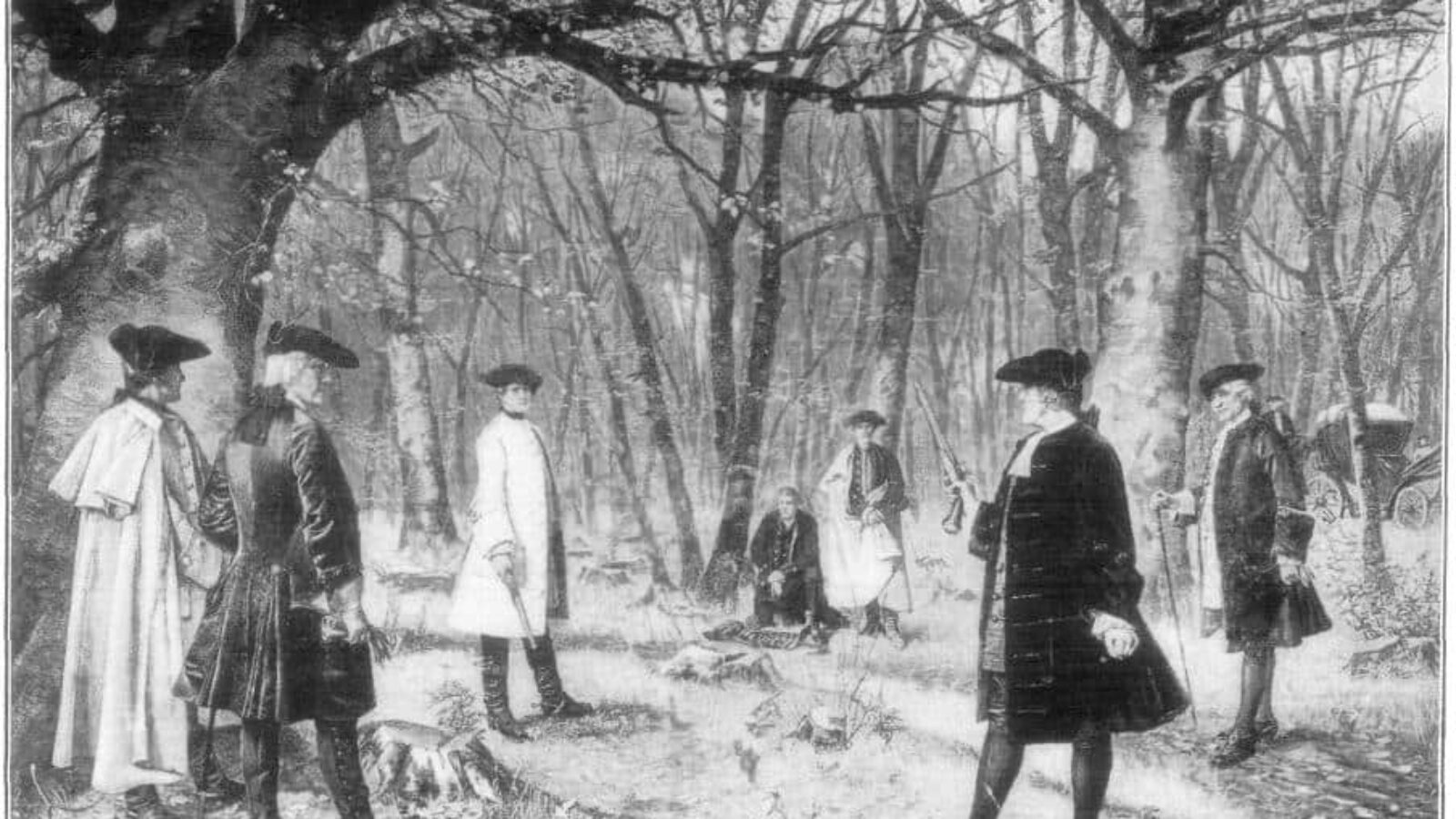July 11, 1804: Founding father and first Secretary of the Treasury Alexander Hamilton was mortally wounded by Vice President Aaron Burr during a duel in Weehawken, New Jersey. The longtime political rivals were unable to resolve their dispute amicably, leading to the pair meeting on the dueling ground. Alexander Hamilton died the following day, and Aaron Burr, charged with two counts of murder, would never hold political office again.
Alexander Hamilton and Aaron Burr’s Duel
On July 11, 1804, Alexander Hamilton and Aaron Burr met on the dueling grounds at Weehawken, New Jersey, to fight the final skirmish of a long-lived political and personal battle. When the duel was over, Hamilton would be mortally wounded, and Burr would be wanted for murder.
Hamilton was a Federalist. Burr was a Republican. The men clashed repeatedly in the political arena. The first major skirmish was in 1791, when Burr successfully captured a United States Senate seat from Philip Schuyler, Hamilton’s powerful father-in-law. Hamilton, then Treasury secretary, would have counted on Schuyler to support his policies. When Burr won the election, Hamilton fumed.
In 1800 Burr obtained and had published “The Public Conduct and Character of John Adams, Esq., President of the United States.,” a document highly critical of Adams, a Federalist. Hamilton, its author, had intended it for private circulation. Its publication proved highly embarrassing to Hamilton and helped widen rifts in the Federalist Party. That same year, when Republicans Aaron Burr and Thomas Jefferson tied in balloting for the presidency, Hamilton lobbied Congress to decide the election in Jefferson’s favor. Hamilton’s campaign had little effect, but in the end, Jefferson emerged the winner.
It was the New York governor’s race of 1804, however, that pushed the two men to violence. In that election, Burr turned his back on the Republicans and ran as an independent. Burr believed that if he won, he would regain power. The prospect of Burr leading New York mortified Hamilton, who despised and mistrusted Burr completely. In early 1804, Hamilton tried to convince New York Federalists not to support Burr.
Although Hamilton’s campaign was probably not the deciding factor, the Burr campaign failed. Burr was crushed in the general election by Morgan Lewis, the Republican candidate, who was supported by George and DeWitt Clinton, powerful New York Republicans.
The battle for New York had been a bruising one, but in the end, a relatively minor slight precipitated the Burr-Hamilton duel. In February, 1804, a New York Republican, Dr. Charles D. Cooper, attended a dinner party at which Alexander Hamilton spoke forcefully and eloquently against Burr. Cooper later wrote a letter to Philip Schuyler in which he made reference to a particularly “despicable opinion” Hamilton expressed about Burr. The letter was published in a New York newspaper the “Albany Register.”
Hoping that a victory on the dueling ground could revive his flagging political career, Burr challenged Hamilton to a duel. Hamilton wanted to avoid the duel, but politics left him no choice. If he admitted to Burr’s charge, which was substantially true, he would lose his honor. If he refused to duel, the result would be the same. Either way, his political career would be over.
After Hamilton’s and Burr’s seconds tried without success to settle the matter amicably, the two political enemies met on the dueling grounds at Weehawken, New Jersey on the morning of July 11. Each fired a shot from a .56 caliber dueling pistol. Burr was unscathed; Hamilton fell to the ground mortally wounded. He died the next day.
Instead of reviving Burr’s political career, the duel helped to end it. Burr was charged with two counts of murder. After his term as vice president ended, he would never hold elective office again. And his next plot to gain power would end with charges of treason.
